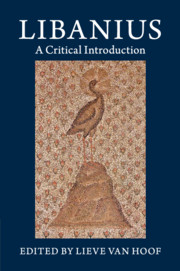Book contents
- Frontmatter
- Dedication
- Contents
- List of tables
- Notes on contributors
- Preface
- Abbreviations
- Introduction: Libanius at the margins
- Part I Reading Libanius
- Part II Libanius’ texts: rhetoric, self-presentation and reception
- Part III Contexts: identity, society, tradition
- Chapter 9 Emperors and empire in Libanius
- Chapter 10 Libanius’ networks
- Chapter 11 Libanius and the literary tradition
- Chapter 12 Libanius and the ‘game’ of Hellenism
- Chapter 13 Not the last pagan: Libanius between elite rhetoric and religion
- Epilogue Libanius at the centre
- Appendices: survey of Libanius’ works and of available translations
- References
- Index locorum
- General index
Chapter 9 - Emperors and empire in Libanius
from Part III - Contexts: identity, society, tradition
Published online by Cambridge University Press: 05 October 2014
- Frontmatter
- Dedication
- Contents
- List of tables
- Notes on contributors
- Preface
- Abbreviations
- Introduction: Libanius at the margins
- Part I Reading Libanius
- Part II Libanius’ texts: rhetoric, self-presentation and reception
- Part III Contexts: identity, society, tradition
- Chapter 9 Emperors and empire in Libanius
- Chapter 10 Libanius’ networks
- Chapter 11 Libanius and the literary tradition
- Chapter 12 Libanius and the ‘game’ of Hellenism
- Chapter 13 Not the last pagan: Libanius between elite rhetoric and religion
- Epilogue Libanius at the centre
- Appendices: survey of Libanius’ works and of available translations
- References
- Index locorum
- General index
Summary
Introduction
Libanius’ long and fairly successful career both as an orator and as an instructor began in 340 when the memory of Constantine the Great was still fresh, and lasted into the final years of Theodosius the Great, coming to a close around 393. During this half-century he was subject to no less than six emperors ruling in the Eastern part of the Roman Empire in which he was born and lived: Constantius II (337–61), Gallus (353–5), Julian (361–3), Jovian (363–4), Valens (364–78) and Theodosius I (379–95). During Julian’s sole reign Libanius acquired a position of influence at court that he had never enjoyed before and was never to enjoy again after Julian’s death. Throughout his career, however, Libanius tried to win the favour of the powerful – provincial governors, vicars and prefects, high officials at court, generals and emperors – and after the accession of Theodosius he even composed a whole series of speeches formally addressed to the reigning emperor. To reconstruct Libanius’ relations with the emperors to whom he was subject is thus one of the main aims of this chapter: how did a confessed pagan manage to obtain and hold a salaried professorship of rhetoric despite the fact that his religion was out of favour with the reigning emperors?
- Type
- Chapter
- Information
- LibaniusA Critical Introduction, pp. 187 - 219Publisher: Cambridge University PressPrint publication year: 2014
- 3
- Cited by



